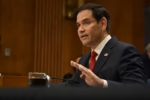Former Director of the Office of Foreign Assets Control at the U.S. Department of the Treasury, John Smith, commented on the recent changes to the executive order for the Western Balkans by President Joe Biden. Smith described the revisions as a sign that the U.S. government remains concerned about the situation in the region.
In an interview with the Voice of America in Bosnian, Smith said the changes also indicate that the U.S. believes sanctions—or the threat of sanctions, as the new executive order did not immediately specify sanctions—will advance U.S. national security and foreign policy objectives in the region.
In a letter to the U.S. Congress on Wednesday, President Biden confirmed that he had decided to maintain the executive order on the Western Balkans, initially issued in 2001 and amended in 2003 and 2021. The decision was made due to the “extremist violent acts, obstructive actions, and the situation in the Western Balkans, which continues to hinder progress towards effective governance and democratic development, as well as full integration into transatlantic institutions… still present an unusual and extraordinary threat to U.S. national security and foreign policy.”
Smith noted that the order had been expanded with additional elements, such as the inclusion of “attempts as a basis for designation”—a change from previous provisions that only referred to actions. Other changes include “adding the measure for membership in a sanctioned entity,” “increasing the measure for ownership or control by the designated individual,” and “extending measures to the spouse or adult children of the designated individual.” These updates suggest that the U.S. government may have specific individuals in mind who could be affected by these new measures.
Smith further stated that the U.S. government might be trying to send a strong message to certain individuals, urging them to change their approach or risk facing U.S. sanctions.
The initial 2001 executive order by former President George W. Bush, following the Balkan wars, had focused on sanctions related to violent extremism, violations of the Dayton Agreement, and UN Resolution 1244 on Kosovo, and had aimed at preventing instability in the region. The order has been renewed annually by subsequent U.S. Presidents.







